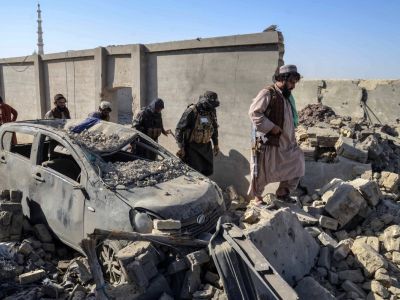Israeli Prime Minister Ariel Sharon has announced that he will not show flexibility on his demand for a week of calm before entering new talks with the Palestinians, who have spent the last 14 months rebelling against 34 years of Israeli military occupation, said reports.
On the eve of a major US policy statement, Sharon refused to ease demands for seven days without "violence" as a condition for new peace talks, AP reported Sunday.
The week must be followed by a six-week cooling-off period before Israel begins confidence-building measures such as a freeze on Jewish settlements, the agency quoted Sharon as saying at a news conference after meeting EU leaders.
AP also reported that Israeli tanks and troops had pushed about 200 yards into Palestinian territory near the Gaza Strip town of Beit Lahiya and killed two armed Palestinians there.
In addition, two other Palestinians, ages 17 and 70, died of wounds suffered in earlier clashes with Israeli forces, added the agency.
Over 700 Palestinians and more than 180 Israelis have been killed in the latest uprising, which erupted last September after Sharon and a huge security contingent barrelled through a disputed holy site in occupied Jerusalem, igniting decades of simmering Palestinian discontent over daily humiliations and poverty.
NO NEW IDEAS FOR PEACE
The EU delegates have no new proposals to put to Middle East leaders, according to the BBC, which said they were not calling for a new initiative, just the political will to implement existing ones.
Any proposal by the EU would, however, have received a chilly reception from Israeli leaders, who accuse the union of bias against Israel.
The view that there are already enough proposals on the table is backed by US Secretary of State Colin Powell, who said on Sunday that he would not introduce a new plan for Middle East peace in his much-anticipated policy speech on Monday.
Powell said Israel and the Palestinians should stick to the terms of an existing ceasefire plan put forward by former US senator George Mitchell, said the UK-based news service the BBC.
"I am not introducing a new plan ... We have a plan, it's a solid plan. It's called the Mitchell committee report," he said in an interview on Fox News.
One of the criteria for implementing the Mitchell report is seven days of absolute calm. Nevertheless, according to the BBC's correspondent in occupied Jerusalem, there has been pressure from the EU and US that this should be dropped because it is "unrealistic."
The EU delegation includes European Commission head Romano Prodi and foreign policy chief Javier Solana and is the highest-level mission to the Mideast since the latest conflict between Israel and the Palestinians erupted 14 months ago.
In the Israeli-EU meetings, Sharon also called on the union to stop transferring funds to the Palestinian Authority, alleging that the money would end up being spent on weapons to use against Israel, said the BBC.
Israel has for several months maintained an economically devastating seige of supposedly autonomous Palestinian Authority enclaves, prompting governments and relief agencies worldwide to step in with aid for the unemployed, hungry and increasingly desperate Palestinian population.
In what could be a sign of exploding frustrations, a bomb went off on a street near the King David Hotel where Sharon was meeting the EU delegation, said the BBC, which reported no injuries or arrests in connection with the blast - Albawaba.com
© 2001 Al Bawaba (www.albawaba.com)









